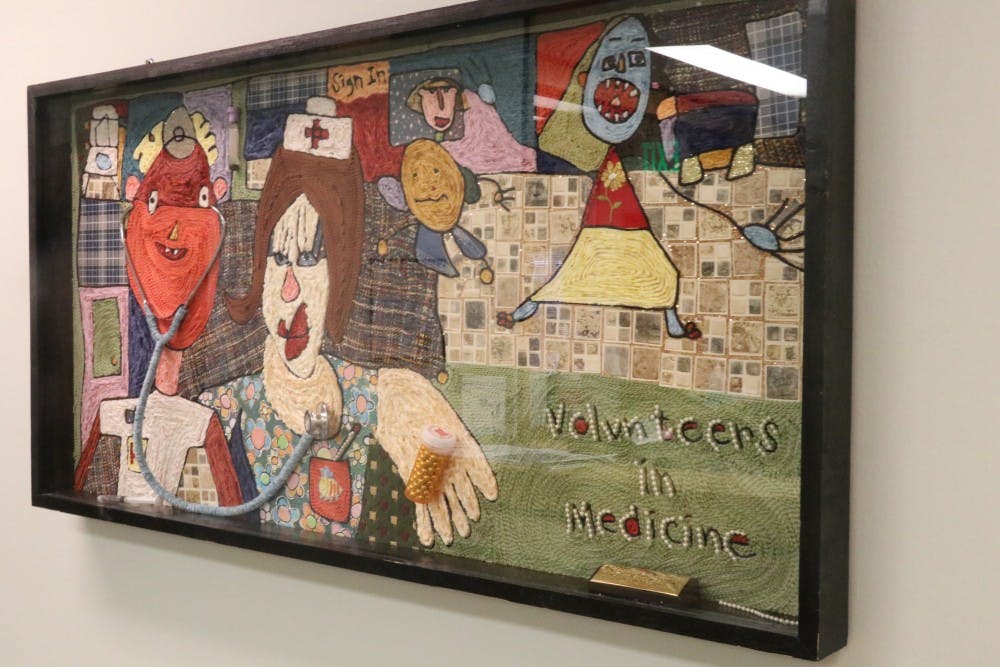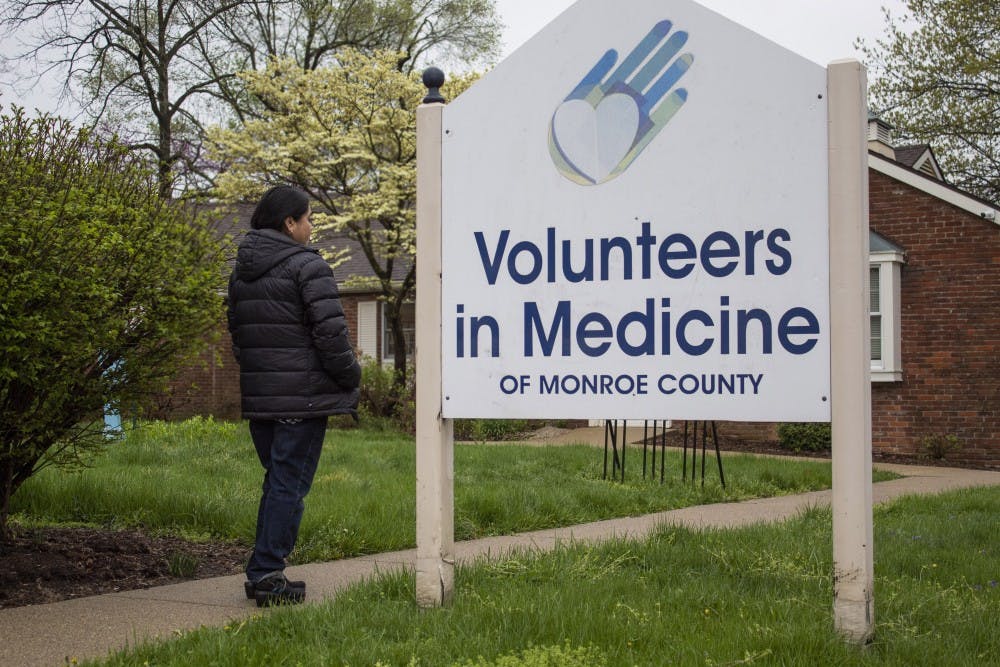One night when José was eight years old, he woke up nauseated and feverish. He was a kid, though – kids get sick all the time, his mother thought. She decided they would wait it out.
Within a day or so, his legs grew weak and wobbly, and the vomiting didn’t stop. But their family had just moved from Mexico City two years earlier, so they didn’t have health insurance yet and couldn’t afford to pay for much without it.
So Maria López took her son to the one place she knew they could get care for free. She has chosen to identify her and her son by their middle names to protect their identities.
When they arrived at Volunteers in Medicine, a clinic located right next to IU Health Bloomington Hospital, staff members helped them get into contact with a pediatric doctor at Riley Hospital for Children at IU Health. Eventually José was diagnosed with Rocky Mountain Spotted Fever, a rare infection caused by a tick bite.
If Maria had decided to wait it out much longer, José could have ended up with brain damage or died.
“I didn’t know what was going on,” she said. “They really helped me to save my son’s life.”
This was about 12 years ago, but Volunteers in Medicine is still the only clinic in Bloomington providing care to uninsured patients. And these days, it’s only getting harder to help those like José.
All undocumented immigrants and those who have had legal status for fewer than five years are ineligible for health care through the Affordable Care Act, leaving them to rely on private insurance or none at all.
In Bloomington, this leaves a significant portion, particularly those who are low income, with the clinic as their only option.
From the beginning of President Trump’s campaign, he has called for increased restrictions on immigration and blamed immigrants for crime and unemployment. As he has moved through his first two years of presidency, rhetoric and national policy continue to be pitted against immigrants — and the clinic is feeling the repercussions.
Shelley Sallee, Volunteers in Medicine assistant director, who began working at the clinic in 2008, said she wasn’t expecting it to be like this.
“I’ve never worked in a place that relied so heavily on the political environment,” she said. “You know, we don’t want to be political, we just want to take care of people.”

Sallee has noticed that more than ever, many patients are hesitant to fill out confidential paperwork, such as the emergency Medicaid forms that will help them get affordable care in life-threatening circumstances.
“They’re afraid that will open them up to deportation, even though it says in the law that they cannot use that information to instigate any kind of deportation,” she said. “But they don’t trust that.”
Although Maria López is a legal resident of the U.S. now, she still feels this fear sometimes.
Some patients bypass the clinic completely and only visit the emergency room as a last resort, but sometimes this can be more harmful than helpful. Samantha Eads, a nurse practitioner at the clinic, knows this from her previous job at an ER.
In the ER, a simple illness can become pricey when doctors are required to conduct a number of required tests before the patient can be released.
“They would come in with maybe a rash or some reflux, things that had simple answers but became complicated because of the setting,” Eads said. “There is this saying that in primary care they play to win, in emergency medicine they play not to lose.”
In 2016, Eads decided to leave her ER profession for the clinic.
“I wanted to treat people proactively rather than letting them wait until the last minute when they were scared,” she said. “I wanted to be part of the solution.”
Taylor Kelley, who specializes in health care policy research at the University of Michigan, said the need for accessible health care for undocumented immigrants is greater now than ever before.
This is not necessarily because there is an increase in those entering the country, he said, but because so many people who are here legally are losing their protected status and are waiting for the government to decide on their future.
In the meantime, even more are left without access to health care.
“If you have a room full of hungry kids and one who isn’t eating, that’s where the greatest need is,” Kelley said. “That kid is the undocumented population.”
Starting last year, the clinic has been facing a new challenge. In September, the Trump administration announced adjustments to the so-called Public Charge regulation that would make it more difficult for immigrants receiving government assistance to qualify for green cards to work legally in the U.S.
Right now, the rule only applies to immigrants on a benefit known as Supplemental Security Income. But the Trump administration wants to expand that program to cover immigrants also receiving food stamps, housing subsidies and most types of Medicaid.
Critics believe this will force millions of people to choose between government assistance and legal status. The changes have not taken effect yet, but many predict they will within the year.
“That changes a lot,” Eads said. “It makes people afraid to ask for help, and it not only affects their wellbeing but their dignity.”
On top of national policy changes, the clinic has smaller-scale problems of its own.
Compared to the IU Health Bloomington Hospital next door, the clinic is lacking. Although it receives funding from the Indiana State Department of Health, Monroe and Owen county councils and several grants, money is still tight sometimes.
No patient who walks through the door will have to pay, which is vital for many patients who cannot afford otherwise. But this means the clinic is left to cover things that other places do not.
“We have to pay for medications, labs, X-rays, MRIs,” Sallee said. “We can’t pay for a surgery, that’s an outrageous amount of money.”
Beyond financial problems, sometimes the staff can be spread thin. In total, there are usually fewer than 20 full- or part-time employees, including dentists and administrative staff. The team is made up of volunteer physicians and nurse practitioners who treat patients and prescribe medications.
As a whole, the clinic treats about 50 patients a day. This can be overwhelming, Eads said, but manageable.
“There’s always room for more,” she said. “We’re all on a journey, and we all need people to help us on our journey.”
For immigrant patients, their care often includes helping them navigate the U.S. health care system, which can be drastically different from what they have known.
Maritza Alvarez, a registered nurse who retired from Volunteers in Medicine in January, left her home in the Dominican Republic 30 years ago for the U.S.
Adjusting to the health care system was difficult, she said, because it was so different from that of the country that raised her. One of the first things she noticed was that many Americans are not in “survival mode.”
Patients schedule checkups even when they’re healthy. They take preventative medications. They have to go out of their way to exercise and choose a healthy diet.
“It’s a lot different here,” she said. “Doctors are helping you even if you’re not sick.”
Throughout her years working as a registered nurse, she added new responsibilities at the clinic as a nurse educator. This meant she would help immigrant patients – and all patients in general – to learn how health care works and to get proper care.
As many patients have demanding or multiple jobs, one of the biggest problems is making time to rest and eat while at work. This is particularly the case for some immigrants, whose visas or legal status only allow them to work certain low-wage jobs regardless of their qualifications.
“Some are working all day, every day and not eating well, and then they come in saying, ‘I don’t know why I’m sick,’” Alvarez said. “There’s a connection between wellbeing and what you’re doing at work.”
The clinic prides itself on providing holistic care like this, Alvarez said. For the Latino community especially — about one third of the clinic’s patients are Latino — this means being involved with other organizations in the Bloomington community.
El Centro Comunal Latino is an organization that provides resources and community events for the Latino community in Bloomington. Director Jane Walter makes sure to maintain a close relationship with the clinic and its patients.
Similar to Alvarez’s role as nurse educator, Walter works to educate the Bloomington Latino community about how to eat nutritiously and live actively. This involves everything from creating an intramural soccer league to visiting classrooms to play games about dental hygiene.
Although it may just seem like fun activities, Walter considers it to be preventative care. If everyone can learn to live healthy lifestyles, then visits to the doctor will be few and far between. This can be a lifesaver for those without insurance or money for copays, she said.
She hopes that getting kids involved will bring in their parents too, which gives them an opportunity to connect to resources they wouldn’t find otherwise.
“Parents don’t necessarily feel the need to provide for themselves, but they want to take care of their kids,” she said.
Maria López can attest to this.
When she got a stress-related rash in 2017, she didn’t go to the doctor for six months because she didn’t want to ask off work at her job as a dental hygienist. But she still uses clinic to get referred to help for her three kids.
José López now goes there as an adult from time to time.
“I tell him to do whatever you can to not get sick,” she said. “But thank God we are here.”




